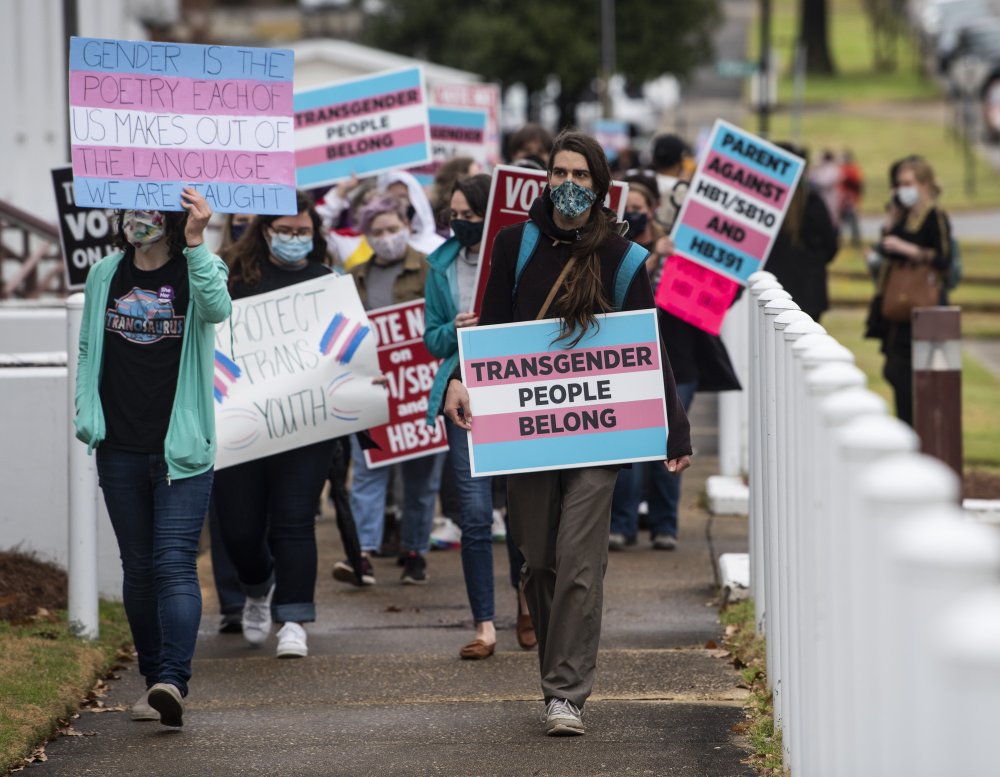Alabama lawmakers attempt to define ‘what is a woman’

Alabama lawmakers on Wednesday advanced legislation that would define who is recognized as female and male under state law. The House Health Committee voted along party lines to approve the “What is a Woman Act” and send the legislation to the full House of Representatives. The bill is similar to measures introduced in several GOP-controlled states and would base the definitions off a person’s reproductive systems. Republican Rep. Susan Dubose, the bill’s sponsor, argued the definitions are needed to protect “women’s spaces” such as dorm rooms. She said the words male and female appear frequently in law without being defined. “Activists have sought to redefine these words and separate sex from biology,” Dubose said when she introduced the bill last week. The bill defines a female and woman as an “individual whose biological reproductive system is designed to produce ova” and a male and man as an “individual whose biological reproductive system is designed to fertilize the ova of a female.” The bill states that it is important to “distinguish between the sexes with respect to athletics, prisons or other detention facilities, domestic violence shelters, rape crisis centers, locker rooms, bathrooms,” and other areas. The bill drew heavy opposition during a public hearing last week, where several transgender women called the bill an attack on their assistance. Carmarion D. Anderson-Harvey, Alabama state director Human Rights Campaign, in a statement Wednesday, called the bill the “LGBTQ+ Erasure Act” that “aims to strip away dozens of legal protections and rights for LGBTQ+ Alabamians.” “LGBTQ+ people have spent decades fighting to be equal members of society, but this bill is a slap in the face to all of the progress we’ve made,” said Anderson-Harvey, who is also a trans woman. Republished with the permission of The Associated Press.
Alabama Senate OKs ban on trans athletes at a college level

Alabama could soon join other states that ban transgender women from playing on female sports teams in college, under legislation nearing final approval in the state. State senators voted 26-4 on Wednesday for the House-passed legislation that extends a 2021 ban on transgender athletes on K-12 sports teams to also include college teams. The bill now returns to the Alabama House of Representatives, where lawmakers must decide whether to accept a minor change to the bill. The bill is part of a wave of restrictions on transgender people being pushed in conservative states. At least 20 other states have now imposed restrictions on transgender athletes at the K-12 or collegiate level, or both. Supporters said transgender women have an unfair advantage in competition. “They are bigger than women. They are stronger. They’re faster. They have larger hearts, denser bones, stronger muscles,” Republican Sen. April Weaver, of Brierfield, said. “I don’t think that is something any hormone therapy can undo.” Opponents have said the bills are about shaming transgender people and are rooted in discrimination and politics. An advocacy group urged Ivey to veto the bill when it comes to her desk. “HB 261 is part of a coordinated effort by extremist politicians trying to advance their anti-LGBTQ+ agenda. These politicians know that state and university sports leagues already have their own governing bodies to determine the best regulations that work for their students. And, they know that an outright ban on transgender athletes exacerbates discrimination against LGBTQ+ people, is not based on the facts, and does not help women’s sports,” said Carmarion D. Anderson-Harvey, Alabama director of the LGBTQ+ advocacy group Human Rights Campaign. The bill states that sports teams “designated for females, women, or girls shall not be open to a biological male.” Similarly, a “biological female” would also not be allowed to participate on teams for boys and men. Democratic Sen. Rodger Smitherman, of Birmingham, asked Weaver how a school would know a person’s gender at birth. Weaver replied that the person’s original birth certificate would suffice. The bill has faced nominal opposition in the Alabama Legislature. The bill cleared the House of Representatives on an 83-5 vote, with more than a dozen members abstaining on the vote. Republished with the permission of The Associated Press.
Alabama House OKs ban on trans athletes at a college level

Transgender women in Alabama would be prohibited from joining female sports teams in college under legislation advanced Tuesday by the Alabama House of Representatives — a part of a wave of restrictions on transgender people being pushed in conservative states. The House voted 83-5 in favor of the legislation that would extend a 2021 ban on transgender athletes in K-12 sports teams to include college teams. The bill states that sports teams “designated for females, women, or girls shall not be open to a biological male.” Similarly, a “biological female” would also not be allowed to participate on teams for boys and men. The legislation now moves to the Alabama Senate. “Forcing women to compete against biological men would reverse decades of progress women have made for equal opportunity in athletics,” Republican Rep. Susan DuBose, the bill’s sponsor, told lawmakers. DuBose said that “no amount of hormone therapy can undo” physical advantages. At least 20 other states have now imposed restrictions on transgender athletes at the K-12 or collegiate level, or both. Supporters said transgender women have an unfair advantage in competition, while opponents argue the bills are rooted in discrimination and fear. “This is discriminatory, and it is unnecessary. States and university sports leagues already have their own governing bodies to determine the best regulations that work for their students,” Carmarion D. Anderson-Harvey, state director for the Human Rights Campaign, said in a statement. The Human Rights Campaign is an advocacy group for LGTQ+ individuals. Rep. Chris England, a Democrat from Tuscaloosa who voted against the bill, said Republicans are acting like the issue is an “epidemic” problem when they can’t name examples of it happening in the state. “This is just an opportunity for people to create an issue or a solution that is looking for a problem,” England said. And Rep. Roland Hollis, a Democrat from Birmingham, said she thinks there are more important issues for the state to address, such as gun violence rates that rank among the highest in the country. Hollis abstained on the vote, along with 13 other lawmakers. Other Democrats supported the bill, however. “It is just not fair for a man to play against the women,” said Rep. Patrick Sellers, a Democrat from Pleasant Grove. Republished with the permission of The Associated Press.


